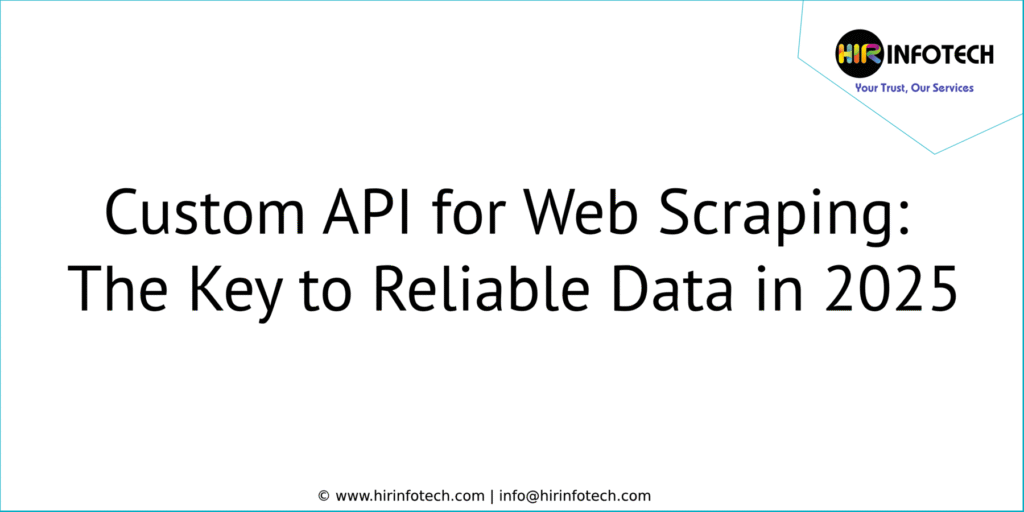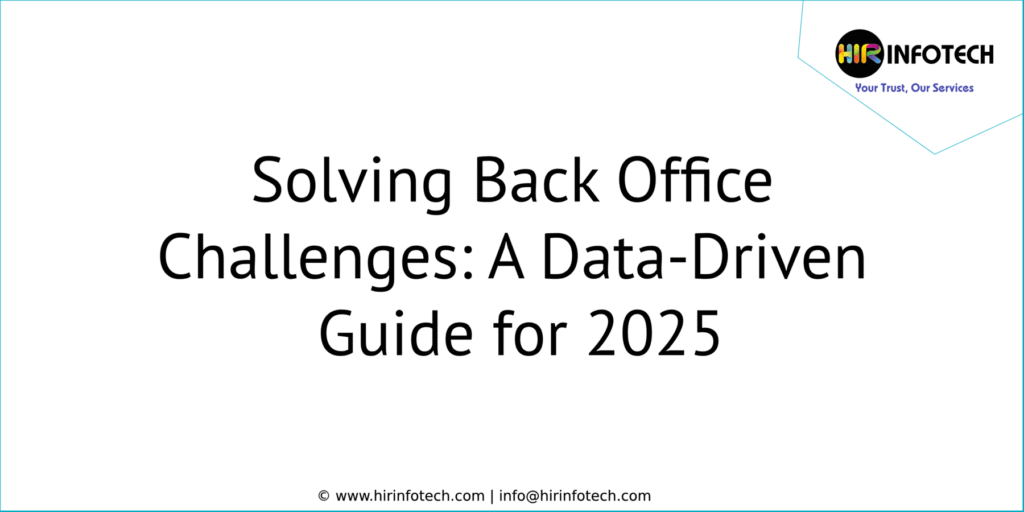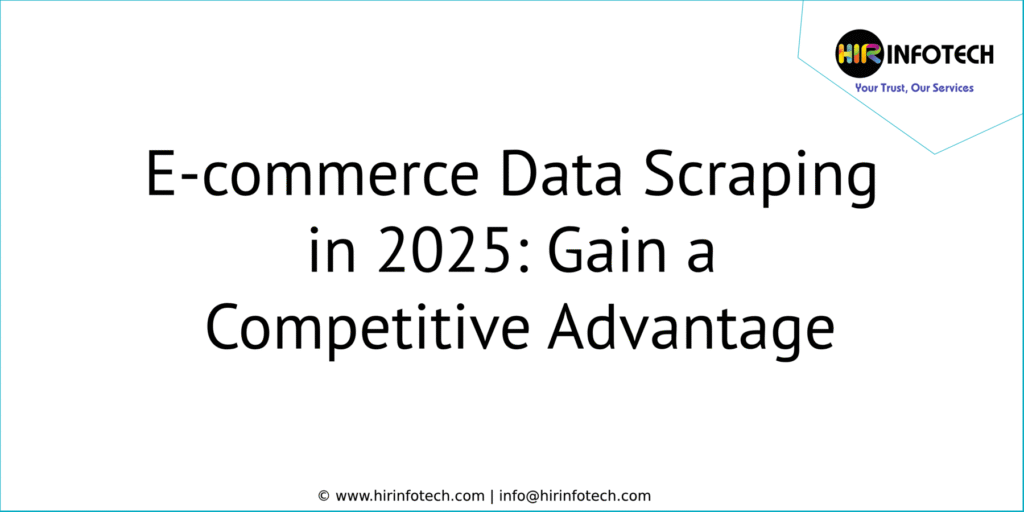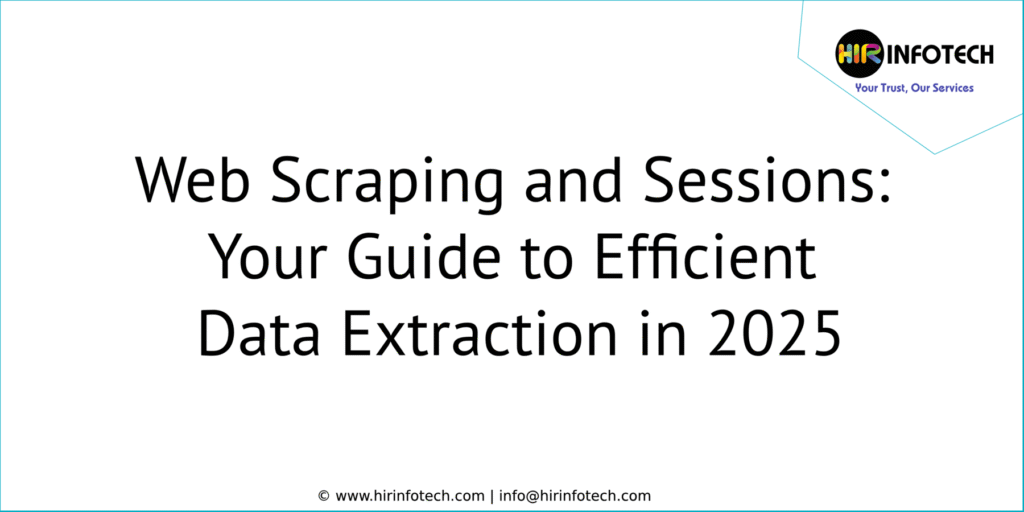
Introduction
In 2025, businesses need accurate and reliable data. Web scraping is a powerful way to get this data. But sometimes, regular web scraping isn’t enough. A custom API for web scraping offers a better solution. This guide explains why a custom API might be the key to unlocking your data needs.
What is a Custom API for Web Scraping?
Let’s break this down:
- API (Application Programming Interface): Think of an API as a messenger. It allows different applications to talk to each other. It’s a structured way to request and receive data.
- Web Scraping: The process of automatically collecting data from websites.
- Custom API: An API built specifically for your web scraping needs. It’s not a generic, off-the-shelf solution.
A custom API for web scraping combines these concepts. It’s a dedicated, tailored connection. This connection allows your systems to get exactly the data they need, directly from the source. It’s like having a custom-built data pipeline.
Why Choose a Custom API over Traditional Web Scraping?
Traditional web scraping (using tools like Beautiful Soup or Scrapy) has limitations:
- Website Changes: Websites change their structure frequently. This can break traditional scrapers.
- Anti-Scraping Measures: Websites often try to block scraping bots.
- Data Complexity: Handling complex websites and dynamic content can be difficult.
- Maintenance: Traditional scrapers require constant maintenance and updates.
- Scalability: Scaling up traditional scraping can be challenging.
A custom API for web scraping addresses these issues:
- Reliability: APIs are designed for data exchange. They are more stable than scraping website code.
- Maintainability: Changes to the website.
- Scalability: APIs are built to handle large volumes of data requests.
- Data Quality: APIs often provide cleaner, more structured data.
- Legal Compliance: Using an API (with permission) is generally more legally sound than scraping without consent.
- Speed: Data gets faster.
Benefits of a Custom API for Web Scraping in 2025
- Reliable Data Access: Get consistent and accurate data, even if the website changes.
- Faster Data Retrieval: APIs are designed for speed, providing data much faster than traditional scraping.
- Reduced Maintenance: Less time spent fixing broken scrapers. The API provider handles most of the maintenance.
- Scalability: Easily handle increasing data needs as your business grows.
- Structured Data: Receive data in a clean, organized format (usually JSON or XML).
- Real-Time Data: Access up-to-the-minute information for timely decisions.
- Integration with Your Systems: Easily integrate the API with your existing applications (CRM, databases, BI tools).
- Cost-Effectiveness: While there’s an initial investment, a custom API can save you money in the long run by reducing maintenance and improving efficiency.
- Security: APIs often offer built-in security features.
- Bypass Anti-Scraping: Avoid anti-scraping technologies.
How a Custom API for Web Scraping Works
- Request: Your application sends a request to the custom API. This request specifies the data you need.
- Data Retrieval: The API interacts with the target website or data source. It retrieves the requested information.
- Data Processing: The API may clean, transform, and format the data.
- Response: The API sends the data back to your application in a structured format (like JSON).
- Integration: Your application uses the data for analysis, reporting, or other purposes.
Use Cases: Where Custom APIs Shine
- E-commerce:
- Real-Time Price Monitoring: Track competitor prices instantly and automatically adjust your own pricing.
- Product Data Aggregation: Gather product information from multiple sources to create a comprehensive product catalog.
- Inventory Management: Monitor product availability in real-time.
- Finance:
- Real-Time Stock Data: Access up-to-the-minute stock prices, financial news, and company data.
- Alternative Data: Gather data from various sources to gain a competitive edge in investment decisions.
- Risk Management: Monitor for potential risks and fraud.
- Real Estate:
- Property Data Aggregation: Collect property listings, pricing data, and market trends from multiple sources.
- Automated Valuation Models (AVMs): Power AVMs with real-time data from a custom API.
- Investment Analysis: Identify potential investment opportunities.
- Marketing and Sales:
- Lead Generation: Gather contact information and qualify leads.
- Market Research: Analyze customer sentiment and track brand mentions.
- SEO Analysis: Monitor competitor websites and improve your search engine rankings.
- Travel and Hospitality:
- Real-Time Flight and Hotel Prices: Access up-to-date pricing and availability information.
- Reputation Management: Monitor customer reviews and feedback.
Choosing a Custom API Provider: Key Considerations
- Expertise and Experience: Choose a provider with a proven track record in building custom APIs and handling web data.
- Technology and Infrastructure: Ensure the provider uses robust and reliable technology.
- Data Quality: How do they ensure data accuracy, completeness, and consistency?
- Scalability: Can the API handle your current and future data needs?
- Customization: Can the API be tailored to your exact requirements?
- Data Delivery Options: What formats are supported (JSON, XML, CSV, etc.)? Can they integrate directly with your systems?
- Pricing: Is the pricing transparent and competitive? Does it fit your budget?
- Support and Maintenance: What level of support and ongoing maintenance is provided?
- Legal and Ethical Compliance: Does the provider adhere to all relevant data privacy regulations and ethical guidelines?
- Security: Check for API security.
Building Your Own Custom API vs. Outsourcing
You have two main options:
- Build In-House: Requires significant technical expertise (programming, web scraping, API development, infrastructure management). Offers maximum control but can be costly and time-consuming.
- Outsource to a Provider (like Hir Infotech): Leverages the expertise of a specialized team. Generally faster, more cost-effective, and allows you to focus on your core business.
The Future of Web Scraping APIs: Trends for 2025 and Beyond
- AI-Powered APIs: Artificial intelligence (AI) and machine learning (ML) are making web scraping APIs even more powerful. AI can:
- Automate Data Extraction: Intelligently identify and extract data elements, even from complex websites.
- Handle Website Changes: Adapt to changes in website structure automatically.
- Improve Data Quality: Clean, validate, and standardize data automatically.
- Real-Time Data Delivery: The demand for real-time data is growing, driving the development of APIs that provide instant access to information.
- Increased Focus on Ethical Data Practices: Greater emphasis on responsible data collection and compliance with privacy regulations.
- Serverless APIs: Using serverless computing to build scalable and cost-effective web scraping APIs.
- Integration with other systems: APIs becoming more integrated.
For more information on API trends, you can explore resources like the Postman Blog.
Frequently Asked Questions (FAQs) – Custom APIs for Web Scraping
- What’s the main advantage of a custom API over using a web scraping tool directly?
- Reliability and maintainability. A custom API is designed for data exchange. It’s less likely to break when a website changes. Web scraping tools often require frequent updates to adapt to website changes.
- Can a custom API handle websites that try to block scraping?
- Yes, a well-designed custom API, built by experts like Hir Infotech, can incorporate various techniques to bypass anti-scraping measures ethically and responsibly. This includes using proxies, rotating user-agents, and implementing intelligent request throttling.
- How is the data delivered through a custom API?
- Typically, data is delivered in structured formats like JSON (JavaScript Object Notation) or XML (Extensible Markup Language). These formats are easily parsed by computers. We can also integrate directly with your databases or other systems.
- How much does a custom API for web scraping cost?
- The cost depends on several factors: the complexity of the data source, the volume of data, the frequency of updates, and the level of customization required. Contact Hir Infotech for a personalized quote.
- How long does it take to build a custom API?
- The development time varies depending on the complexity of the project. A simple API might take a few weeks, while a more complex one could take several months. We provide realistic timelines and keep you informed throughout the process.
- Can a custom API provide real-time data?
- Yes, absolutely. Custom APIs can be designed to provide real-time or near real-time data updates, depending on your needs and the capabilities of the data source.
- What if the website I want to get data from changes?
- We provide maintenance and handle changes.
Hir Infotech: Your Partner for Custom API Web Scraping Solutions
Hir Infotech specializes in building robust, reliable, and ethical custom APIs for web scraping. We provide end-to-end solutions, from initial consultation and design to development, deployment, and ongoing maintenance. We offer:
- Expert Development Team: Our team has extensive experience in API development, web scraping, and data processing.
- Customized Solutions: We build APIs tailored to your exact requirements, ensuring you get precisely the data you need.
- Advanced Technology: We utilize the latest technologies, including AI-powered scraping techniques, to maximize efficiency and accuracy.
- Scalability and Reliability: Our APIs are designed to handle large volumes of data requests and provide consistent performance.
- Data Quality Assurance: We implement rigorous quality control processes to ensure the data we deliver is accurate, complete, and up-to-date.
- Security and Compliance: We prioritize data security and adhere to all relevant data privacy regulations.
- Ongoing Support and Maintenance: We provide ongoing support and maintenance to ensure your API continues to function flawlessly.
- Competitive Pricing: Check our pricing and plans.
Data Scraping, Web Crawling, and APIs: A Connected Ecosystem
It’s important to understand how these terms relate:
- Data Scraping: The general term for extracting data.
- Web Crawling: Often the first step in a web scraping project. The crawler finds the relevant web pages.
- Web Scraping: Then, scraping extracts the specific data from those pages.
- Custom API: Provides a structured and reliable way to access the scraped data, often after the crawling and scraping have been done. It’s the delivery mechanism.
The Ethical Imperative: Responsible Data Acquisition
While custom APIs and web scraping offer tremendous power, it’s crucial to use them responsibly and ethically. Always:
- Respect Website Terms of Service: Carefully review and comply with the terms of service of any website you are accessing data from.
- Obtain Necessary Permissions: If you are collecting personal data, obtain explicit consent from individuals as required by law (GDPR, CCPA, etc.).
- Avoid Overloading Servers: Implement polite scraping practices, including delays between requests, to avoid disrupting the target website’s operations.
- Be Transparent: If appropriate, identify your scraping activity (e.g., with a custom user-agent string).
- Protect the collected Data: Use appropriate security measures.
For further guidance on ethical data practices, consult resources like the Data & Society Research Institute.
Ready to unlock the power of reliable, real-time data with a custom API for web scraping? Contact Hir Infotech today! We’re experts in web scraping, data solutions, and data analytics. We’ll help you design and implement a custom API that meets your specific needs and delivers the insights you need to succeed. Let’s discuss your project and transform your data strategy.
#CustomAPI #WebScrapingAPI #DataExtraction #WebScraping #DataSolutions #API #DataIntegration #RealTimeData #BusinessIntelligence #DataAnalytics #HirInfotech #DataDrivenDecisions #2025Trends #EthicalScraping #APIDevelopment



